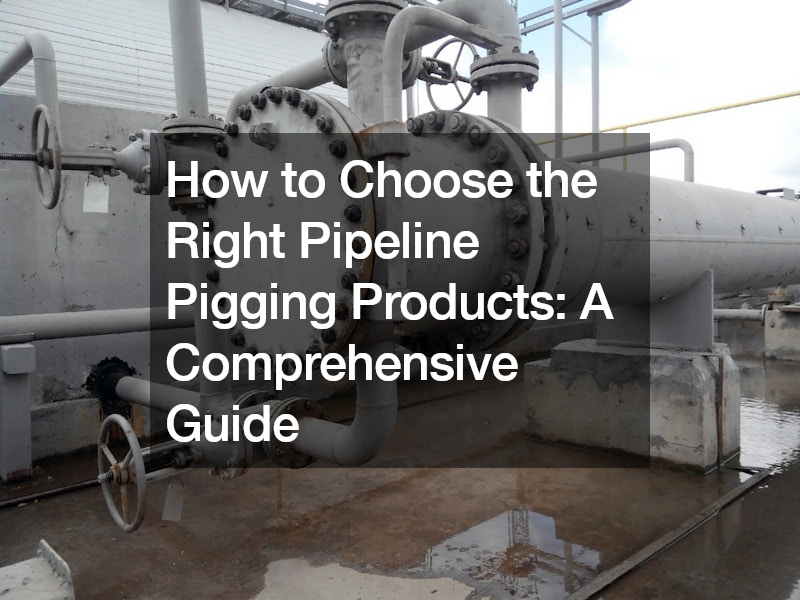
Pipeline pigging products play a crucial role in maintaining the integrity and efficiency of pipelines across various industries. With a wide range of options available, selecting the right pigging products can be challenging. In this comprehensive guide, we’ll explore the different types of pipeline pigging products and provide valuable insights on choosing the best ones for your specific needs.
Understanding Pipeline Pigging Products
Pipeline pigging products, commonly called pigs, are devices inserted into pipelines for various maintenance tasks, including cleaning, inspection, and product separation. These products come in different densities, sizes, and materials to suit different pipeline conditions and requirements.
Light Density Foam Pigs: Light-density foam pigs, typically weighing around 17 kilos per cubic meter, are ideal for softer cleaning tasks. They feature a sealed base to prevent water ingress and maintain movement through the pipeline.
Green Foam Pigs: With a density of 27 kilos per cubic meter, green foam pigs balance flexibility and durability. They are popular choices for cleaning and maintenance tasks in pipelines.
Pink Foam Pigs: Pink foam pigs, also known as intermediate pigs, have a density of 42 kilos per cubic meter. They come with a sealed base and a beveled or bullet-shaped top, making them suitable for more demanding cleaning applications.
Orange Foam Pigs: These medium-density pigs, weighing around 80 kilos per cubic meter, are designed for tougher cleaning jobs. They feature a sealed base and a pronounced bullet top for enhanced performance.
Heavy Foam Pigs: Heavy-density foam pigs, with a density of 128 kilos per cubic meter, are the most robust option available. They are capable of tackling highly challenging cleaning tasks and are essential for maintaining pipeline integrity.
Choosing the Right Pipeline Pigging Products
When selecting pipeline pigging products, several factors must be considered to ensure optimal performance and efficiency:
Pipeline Diameter: Choose pigs that match the diameter of your pipeline to ensure a proper fit and effective cleaning or inspection.
Pipeline Material: Consider the material of your pipeline, whether it’s metal, plastic, or composite, as it can impact the type of pigging product required for safe and efficient operation.
Pipeline Conditions: Assess the condition of your pipeline, including the presence of debris, corrosion, or buildup, to determine the appropriate pigging product and cleaning method.
Operational Requirements: Determine the specific tasks and objectives of pigging operations, such as cleaning, inspection, or product separation, to select the most suitable pigging products for the job.
Budget and Cost-effectiveness: Evaluate the cost of pipeline pigging products relative to their performance and longevity to ensure cost-effective maintenance solutions.Real-time Examples of Pipeline Pigging Products
Light Density Foam Pigs: Light density foam pigs, such as those weighing 17 kilos per cubic meter, are ideal for cleaning delicate pipelines or removing light debris. These pigs are commonly used in industries where gentle cleaning is required, such as in food processing or pharmaceutical manufacturing. For example, in a food processing plant, light density foam pigs can be employed to clear residue from production lines without causing damage to sensitive equipment or contaminating the product. Additionally, in the pharmaceutical industry, these foam pigs are used to sanitize pipelines between batches to ensure product purity and compliance with regulatory standards.
Medium Density Foam Pigs: Medium density foam pigs, with a weight of 42 kilos per cubic meter, strike a balance between flexibility and effectiveness. They are commonly utilized in oil and gas pipelines for routine maintenance and removal of moderate debris. For instance, in a crude oil pipeline, medium density foam pigs can be employed to dislodge paraffin wax buildup, ensuring smooth flow and preventing pipeline blockages. Similarly, in natural gas transmission lines, these pigs can be used to remove scale and rust deposits, optimizing pipeline efficiency and prolonging asset lifespan.
Heavy Density Foam Pigs: Heavy density foam pigs, weighing 128 kilos per cubic meter, are designed for demanding cleaning tasks in industrial pipelines. These pigs are capable of removing stubborn deposits and providing thorough cleaning in challenging environments. For example, in a chemical processing plant, heavy density foam pigs can be used to eliminate hardened chemical residues and contaminants from process pipelines, ensuring product quality and preventing corrosion. Similarly, in wastewater treatment facilities, these pigs are employed to clear sludge and sediment buildup from sewer lines, maintaining proper flow rates and preventing backups.
Coated Foam Pigs: Coated foam pigs offer enhanced durability and resistance to abrasion, making them suitable for use in abrasive or corrosive environments. These pigs are commonly utilized in offshore oil and gas production platforms, where pipelines are exposed to harsh seawater conditions and corrosive chemicals. For instance, in a subsea pipeline carrying hydrocarbons from an offshore oil rig to an onshore processing facility, coated foam pigs can be deployed for regular cleaning and corrosion mitigation, ensuring pipeline integrity and minimizing maintenance downtime.
Steel Pigs: Steel pigs are robust pigging products designed for heavy-duty cleaning and inspection tasks in industrial pipelines. These pigs are commonly used in oil refineries, petrochemical plants, and pipeline construction projects. For example, in a refinery pipeline undergoing scheduled maintenance, steel pigs equipped with brushes or scrapers can be employed to remove hardened deposits and inspect the integrity of the pipeline wall. Additionally, in a new pipeline construction project, steel pigs can be used for pre-commissioning cleaning to remove construction debris and ensure compliance with industry standards.
By choosing the right pipeline pigging products for your specific application, you can ensure efficient pipeline maintenance, prolong asset lifespan, and minimize operational downtime. Whether you require light density foam pigs for gentle cleaning or heavy-duty steel pigs for demanding tasks, selecting the appropriate pigging products is essential for achieving optimal performance and reliability in your pipeline system.
.

